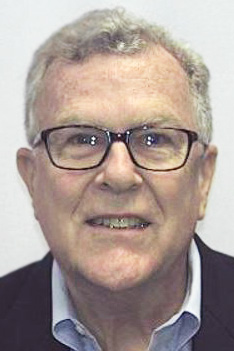

 Ali's invitation to post reflections on the past 25 years of ICANN is very welcome. No doubt, some will write about major shifts in how ICANN is governed, for example, the end of United States government oversight. While others will write about changes to the industry that ICANN has catalyzed, for example, the 2012 round of new gTLDs and the upcoming next application process. more
Ali's invitation to post reflections on the past 25 years of ICANN is very welcome. No doubt, some will write about major shifts in how ICANN is governed, for example, the end of United States government oversight. While others will write about changes to the industry that ICANN has catalyzed, for example, the 2012 round of new gTLDs and the upcoming next application process. more
 I'm happy to report (mostly) positive feedback on my last article that examined how the multistakeholder model tackled, and tackled well, Phase 1 of the review of all Rights Protection Mechanisms. While bad news may sell more clicks, a little good news from time to time also appears to be welcome. Good news also reminds us of how fortunate we are to have a private sector ICANN with a multistakeholder model of policy development... more
I'm happy to report (mostly) positive feedback on my last article that examined how the multistakeholder model tackled, and tackled well, Phase 1 of the review of all Rights Protection Mechanisms. While bad news may sell more clicks, a little good news from time to time also appears to be welcome. Good news also reminds us of how fortunate we are to have a private sector ICANN with a multistakeholder model of policy development... more
 I was in a conversation with a close friend the other day, you know the kind where you have been friends for so long that you have endured each other experimenting with changed politics, evolving religion, and if you are unlucky, flirtations with multilevel marketing. We were discussing politics that day, which is not unusual given our ancient friendship and the recent change at the helm of the United States. more
I was in a conversation with a close friend the other day, you know the kind where you have been friends for so long that you have endured each other experimenting with changed politics, evolving religion, and if you are unlucky, flirtations with multilevel marketing. We were discussing politics that day, which is not unusual given our ancient friendship and the recent change at the helm of the United States. more
 With DNS abuse a topic of increased concern throughout the community, any controversy over adopting the Uniform Rapid Suspension System (URS) for all generic top-level domains (gTLDs) seems misplaced. The URS was designed as a narrow supplement to the Uniform Domain-Name Dispute Resolution Policy (UDRP), applicable only in certain tightly defined circumstances of clear-cut and incontrovertible trademark infringement involving the registration and use of a domain name. more
With DNS abuse a topic of increased concern throughout the community, any controversy over adopting the Uniform Rapid Suspension System (URS) for all generic top-level domains (gTLDs) seems misplaced. The URS was designed as a narrow supplement to the Uniform Domain-Name Dispute Resolution Policy (UDRP), applicable only in certain tightly defined circumstances of clear-cut and incontrovertible trademark infringement involving the registration and use of a domain name. more
 A fundamental rule of trademarks is that they have to be distinctive, and that nobody can register a trademark on a generic term like "wine" or "plastic." In a case decided today by the U.S. Supreme Court, the court decided 8-1 that online travel agent Booking.com could register its domain name as a trademark. In this case, I think the majority got it wrong, and Justice Breyer's lone dissent is correct. more
A fundamental rule of trademarks is that they have to be distinctive, and that nobody can register a trademark on a generic term like "wine" or "plastic." In a case decided today by the U.S. Supreme Court, the court decided 8-1 that online travel agent Booking.com could register its domain name as a trademark. In this case, I think the majority got it wrong, and Justice Breyer's lone dissent is correct. more
 I was on the front lines of the SOPA wars, because SOPA touched on two matters of strong personal and professional importance for me: protecting the Internet infrastructure, and protecting the economy from Internet related crime. I've continued to study this field and advise industry participants in the years since then. The 2017-02-20 paper by Annemarie Bridy entitled Notice and Takedown in the Domain Name System: ICANN's Ambivalent Drift into Online Content Regulation deserves an answer, which I shall attempt here. more
I was on the front lines of the SOPA wars, because SOPA touched on two matters of strong personal and professional importance for me: protecting the Internet infrastructure, and protecting the economy from Internet related crime. I've continued to study this field and advise industry participants in the years since then. The 2017-02-20 paper by Annemarie Bridy entitled Notice and Takedown in the Domain Name System: ICANN's Ambivalent Drift into Online Content Regulation deserves an answer, which I shall attempt here. more
 The Uniform Domain Name Dispute Resolution Policy, commonly known as the UDRP, was first introduced on October 24, 1999, by the Internet Corporation for Assigned Names and Numbers (ICANN). The UDRP is incorporated by reference into Registration Agreements for all generic top-level domain names (gTLDs) and some country-code top-level domain names (ccTLDs). more
The Uniform Domain Name Dispute Resolution Policy, commonly known as the UDRP, was first introduced on October 24, 1999, by the Internet Corporation for Assigned Names and Numbers (ICANN). The UDRP is incorporated by reference into Registration Agreements for all generic top-level domain names (gTLDs) and some country-code top-level domain names (ccTLDs). more
 When properly used, the UDRP enables trademark owners to take control of abusive domain names. Yet sometimes the UDRP itself is misused by trademark owners to try to seize desirable domain names to which they have no legal entitlement. Is there a downside to misusing the UDRP to attempt a domain name hijacking? Unscrupulous companies at times misuse the UDRP by improperly invoking its power to compel a transfer of ownership in order to seize inherently valuable, non-infringing domain names that the companies desire for their own use. more
When properly used, the UDRP enables trademark owners to take control of abusive domain names. Yet sometimes the UDRP itself is misused by trademark owners to try to seize desirable domain names to which they have no legal entitlement. Is there a downside to misusing the UDRP to attempt a domain name hijacking? Unscrupulous companies at times misuse the UDRP by improperly invoking its power to compel a transfer of ownership in order to seize inherently valuable, non-infringing domain names that the companies desire for their own use. more
 The weighing of evidence involves the connecting of dots, which involves drawing inferences. However, just as there can be false positives, there can be false inferences. The tendency may be to think of inferences as coming in one size, but not all inferences are logically correct. Some are weak and others strong. The reason for talking about both kinds is that so much depends on the quality of their making. more
The weighing of evidence involves the connecting of dots, which involves drawing inferences. However, just as there can be false positives, there can be false inferences. The tendency may be to think of inferences as coming in one size, but not all inferences are logically correct. Some are weak and others strong. The reason for talking about both kinds is that so much depends on the quality of their making. more
 Not all domain names identical or confusingly similar to trademarks are actionable. Exhibit 1 are complainants whose trademarks postdate domain name registration. The latest example of this is Insight Energy Ventures LLC v. Alois Muehlberger, L.M.Berger Co.Ltd., D2016-2010 (WIPO December 12, 2016) (<powerly.com>) but there are other, more esoteric examples such as loss by genericide, Shop Vac Corporation v. Md Oliul Alam / Quick Rank, FA1611001701026 (Forum December 10, 2016). more
Not all domain names identical or confusingly similar to trademarks are actionable. Exhibit 1 are complainants whose trademarks postdate domain name registration. The latest example of this is Insight Energy Ventures LLC v. Alois Muehlberger, L.M.Berger Co.Ltd., D2016-2010 (WIPO December 12, 2016) (<powerly.com>) but there are other, more esoteric examples such as loss by genericide, Shop Vac Corporation v. Md Oliul Alam / Quick Rank, FA1611001701026 (Forum December 10, 2016). more
 Over the course of the last decade, in response to significant pressure from the US government and other governments, service providers have assumed private obligations to regulate online content that have no basis in public law. For US tech companies, a robust regime of "voluntary agreements" to resolve content-related disputes has grown up on the margins of the Digital Millennium Copyright Act (DMCA) and the Communications Decency Act (CDA). more
Over the course of the last decade, in response to significant pressure from the US government and other governments, service providers have assumed private obligations to regulate online content that have no basis in public law. For US tech companies, a robust regime of "voluntary agreements" to resolve content-related disputes has grown up on the margins of the Digital Millennium Copyright Act (DMCA) and the Communications Decency Act (CDA). more
 A split Panel in an early decision under the Uniform Domain Name Dispute Resolution Policy (UDRP) held that parties deserve more than "[i]t depends [on] what panelist you draw." Time Inc. v. Chip Cooper, D2000-1342 (WIPO February 13, 2001). That's one side of the paradigm; the other side makes demands on the parties to prove their contentions, either of cybersquatting (one element of which is proving that respondent lacks rights or legitimate interests) or rebutting the claim (one element of which is respondent demonstrating it has rights or legitimate interests). more
A split Panel in an early decision under the Uniform Domain Name Dispute Resolution Policy (UDRP) held that parties deserve more than "[i]t depends [on] what panelist you draw." Time Inc. v. Chip Cooper, D2000-1342 (WIPO February 13, 2001). That's one side of the paradigm; the other side makes demands on the parties to prove their contentions, either of cybersquatting (one element of which is proving that respondent lacks rights or legitimate interests) or rebutting the claim (one element of which is respondent demonstrating it has rights or legitimate interests). more
ICANN has released temporary specifications for gTLD registration data in order to establish temporary requirements needed for the organization and gTLD registry operators to continue to comply with existing ICANN contractual requirements and community-developed policies. more
 Panels appointed to hear and decide disputes under the Uniform Domain Name Dispute Resolution Policy (UDRP) have long recognized that three letter domains are valuable assets. How investors value their domains depends in part on market conditions. Ordinarily (and for good reason) Panels do not wade into pricing because it is not a factor on its own in determining bad faith. more
Panels appointed to hear and decide disputes under the Uniform Domain Name Dispute Resolution Policy (UDRP) have long recognized that three letter domains are valuable assets. How investors value their domains depends in part on market conditions. Ordinarily (and for good reason) Panels do not wade into pricing because it is not a factor on its own in determining bad faith. more
 I have hesitated in writing this memorial for udrpsearch.com because I did not want to announce a demise that may not be true or the fear that my saying it will make it so. The website went dark for a short period in 2017, before being restored after a brief shutdown, and (I thought) it could happen again. I was waiting for history to repeat itself. But, the website remains dark, without explanation, and I fear it will not return. We lost it on or about January 6, 2018. more
I have hesitated in writing this memorial for udrpsearch.com because I did not want to announce a demise that may not be true or the fear that my saying it will make it so. The website went dark for a short period in 2017, before being restored after a brief shutdown, and (I thought) it could happen again. I was waiting for history to repeat itself. But, the website remains dark, without explanation, and I fear it will not return. We lost it on or about January 6, 2018. more